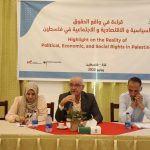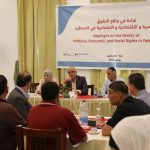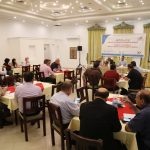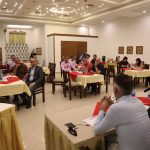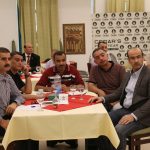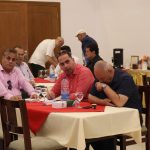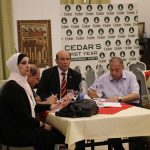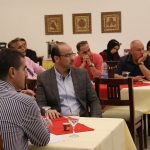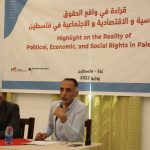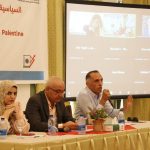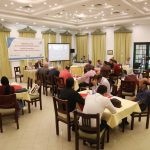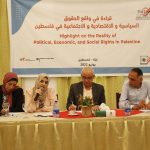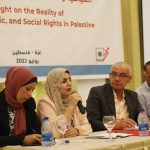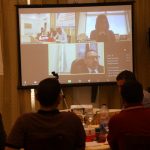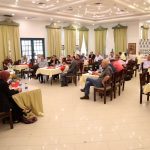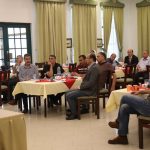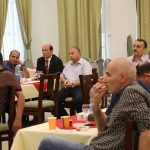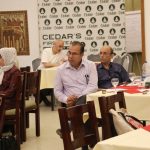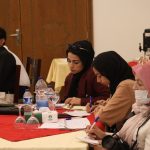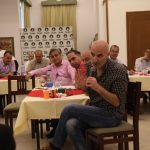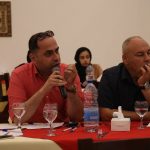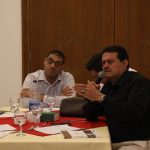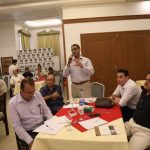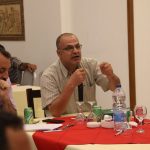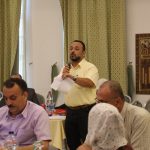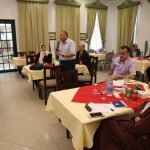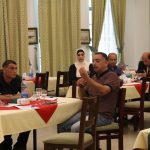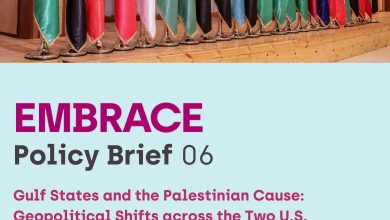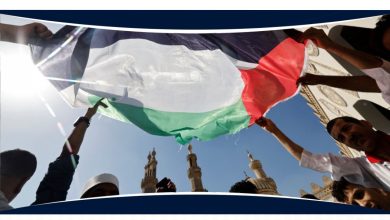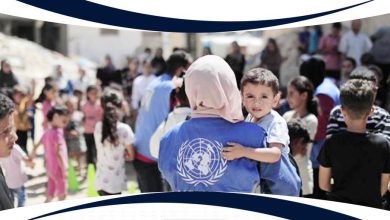PalThink holds seminar on public rights in Palestinian territories
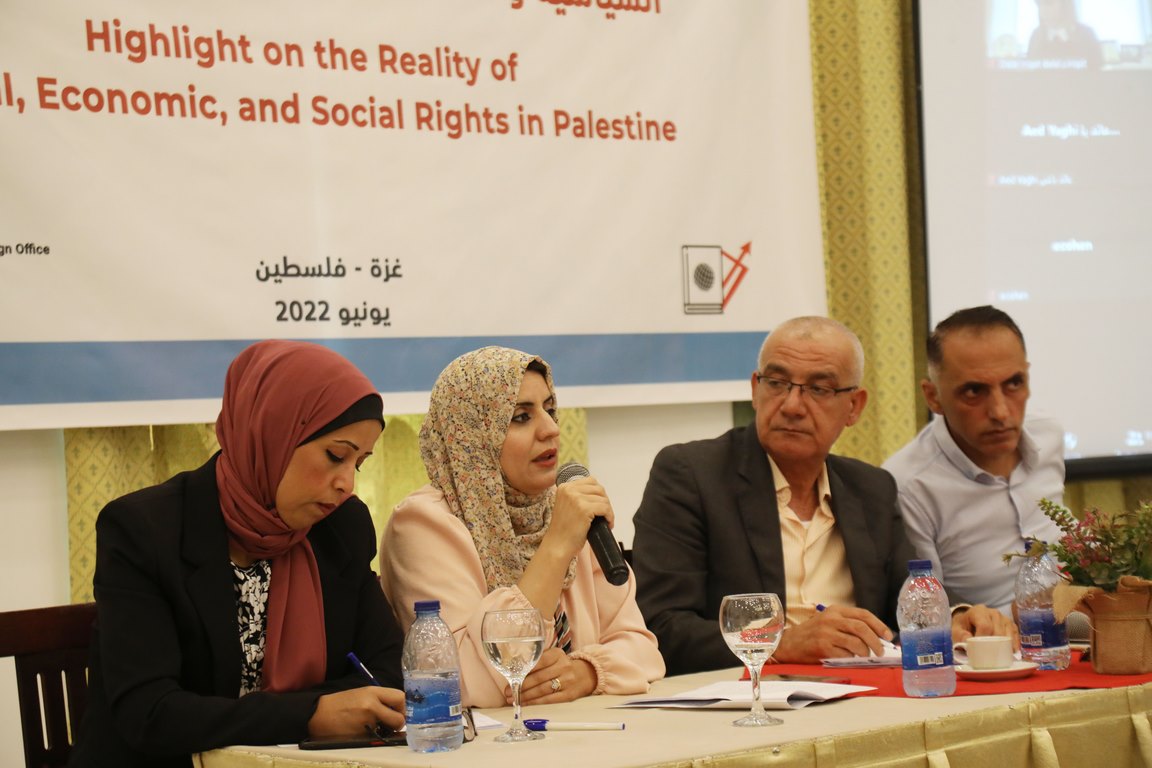
As part of the PalThink Academy for Democracy and Human Rights’ activities project, PalThink for Strategic Studies held a seminar on Thursday titled “Reflecting on the Situation of Political, Economic, and Social Rights in Palestine”. Dozens of prominent human rights activists, experts, researchers, and civil society representatives from inside and outside the Gaza Strip participated.
Omar Shaban, Director General of PalThink for Strategic Studies opened the seminar. He said: “The human rights report being discussed today is the second policy paper of the project. It does not seek to provide a detailed record of human rights violations, which is the mission of human rights organizations, but it delivers a qualitative analysis and a general review of the situation of these rights in light of the Palestinian division.
“PalThink is an independent Palestinian institution that seeks to represent the Palestinian national agenda in the present and the future, with a high degree of freedom in deciding its views without any donor dictates.”
In his turn, researcher Dr. Talal Abu Rokba said: “Good governance is a key indicator, and it must remain consistent with human rights in four domains: the rule of law, democratic institutions, providing public services for the citizens, and fighting corruption.”
“The Palestinian democratic process has been deactivated since 2007, resulting in devastating consequences such as the non-renewal of the structures of the Palestinian system and the disruption of the balance between political system elements, especially the three powers.”
Abu Rokba noted that there is a troubled relationship between civil society organizations and the existing authorities due to the strict restrictions on their bank accounts.
“Despite achieving quantitative progress, the education sector is still behind in terms of quality. The large gap between the educational system and the labor market is the result of the commodification of education,” he said.
Women’s affairs researcher Tahani Qasem, said: “Violations against journalists from summons, arrests, to raiding journalists’ offices exist in the West Bank and the Gaza Strip. This indicates a disregard for the rights guaranteed in Palestinian law—including the Press and Publication Law—and international conventions regulating freedom of journalism.
“The right to express opinions, general freedoms, and the right to peaceful assembly are violated in the West Bank and the Gaza Strip.
“Youth under the age of 33 have never exercised their right to vote due to the Palestinian division that disrupted the Legislative Council. This hindered the passage of important laws such as the family protection law and others.”
She concluded by saying that “even the organizers of campaigns demanding the end of the division were arrested”.
Dr. Samia Al Ghussain, an international law lecturer, said: “Health services provided for citizens are disastrous, especially in the Gaza Strip. Whereas, services offered to pregnant women and children are satisfactory, thanks to UNRWA. However, 21% of Palestinians do not have health insurance, and getting a medical transfer is very difficult in the West Bank and the Gaza Strip.
“While governmental health services have declined, the private health sector thrived. This means that the right of heath has become limited to those financially capable.”
She touched on the unemployment rates that exceeded 50% among men and more than 90% among women.
She said: “More than 350,000 graduates have not gotten a single job in the Gaza Strip, and it takes seven years on average for a graduate to get their first job. However, in the West Bank, the unemployment rate is low due to the Palestinian labor market’s association with the Israeli market. This, in turn, has created the ‘permit brokers’ phenomenon”
Commenting on the report, Dr. Ammar Dwaik, Director General of the Independent Commission for Human Rights, said: “Human rights violations have not stopped even since before the division when the Legislative Council was active. However, the division perpetuated this terrible situation, and the absence of the Legislative Council cost us one of the pillars of democracy.
“Despite the poor indices of human rights in Palestine, the situation is far better than that of the surrounding Arab countries. However, the ruling class in the West Bank and the Gaza Strip carry a political authoritarianism culture, similar to other regimes in the region. And both Hamas and Fatah use human rights discourse against the other when one of them commits a violation.
“While the international community is partly responsible for the current situation, traditional ideologies challenge modern human rights thought. Hence, it is necessary to use the human rights discourse genuinely away from double standards.
“The Palestinian civil society is very powerful and capable of protecting the citizens, as it canceled unfair legislations despite all the imposed Israeli restrictions.”
Dr. Dalal Erekat, a political science lecturer at the Arab American University, said, “Because we live under occupation (our main challenge), we have always avoided solving our basic problems and blame the occupation instead”.
She stressed the importance of conducting elections to end the division—which she described as the second Nakba—to implement and enforce the laws related to human rights in the Basic Law.
“The high indices of human rights violations are unbecoming of the Palestinian struggle, history, and values. General policies should reflect the will of people, expressed in seminars, peaceful assemblies, and peaceful expression of opinion”.
She asserted that the rate of women’s representation in senior positions and in the diplomatic corps is very low and unfair to the Palestinian women and their capabilities and that it reflects the will of the Palestinian decision-maker only.
“We, the Palestinian people, should not compare ourselves with the surrounding countries. With our resistance, education, and culture, we are far better than many countries and we deserve better conditions,” she said.
Meanwhile, the audience’s questions and comments revolved around the means for tackling human rights violations, the relationship between the deteriorating economy and the increased human rights violations, the means for fighting the pretexts under which these violations were committed, and the importance of the role of civil society in fighting the executive authority’s infringement on the legislative authority, the judicial authority, and human rights.
PalThink Academy for Democracy and Human Rights’ activities continue in cooperation with the IFA. All the academy’s seminars, sessions, policy papers, and reports are available on its website, which is a platform for youth to publish their research. The academy also includes the Democracy and Youth Dialogue Forum, which is an incubator for youth to discuss human rights and legal matters.

